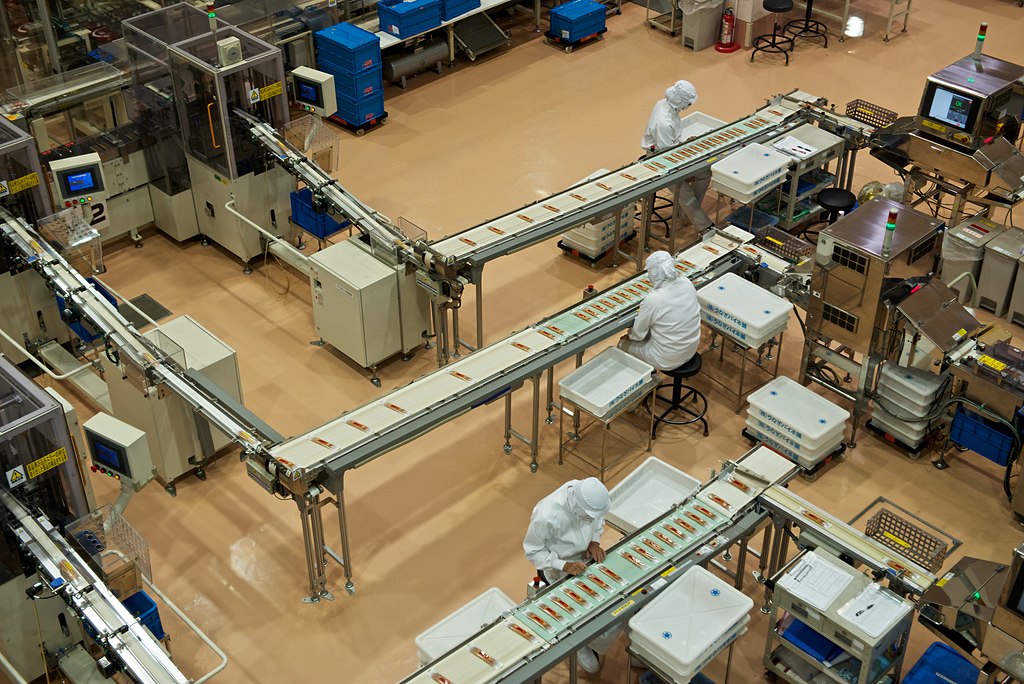Japan's industrial production rebounded in February, rising 2.5% from the previous month, slightly above the forecasted 2.3%, according to data from the Ministry of Economy, Trade and Industry (METI). This follows a 1.1% decline in January, offering a temporary boost for an economy grappling with mounting global trade risks.
Production machinery, including semiconductor equipment, surged 8.2%, while electronic parts and devices rose 10.1%. However, motor vehicle production inched up just 0.2%. The government noted no direct impact from U.S. tariff threats yet, but emphasized close monitoring of developments, particularly following an early March accident at a Toyota supplier, Chuo Spring.
Despite February’s gains, manufacturers forecast slower growth ahead, expecting output to rise only 0.6% in March and 0.1% in April. Analysts attribute this cautious outlook to weakening global demand, notably from the U.S., China, and Europe. Shungo Akimoto of Mizuho Securities warned of a moderate pace in future industrial output, citing a global slowdown driven by declining U.S. consumer sentiment and sluggish recoveries abroad.
Adding to concerns, Japan’s retail sales grew just 1.4% in February year-over-year, falling short of the expected 2.0% and decelerating sharply from January's 4.4% gain. Subdued domestic consumption, paired with rising external threats, casts doubt on sustained economic momentum.
A major worry for Japan is U.S. President Donald Trump's proposed 25% tariffs on auto imports, set to take effect soon. With automobiles accounting for 28.3% of Japan’s exports to the U.S. in 2024, any disruption could significantly impact Japan’s export-reliant economy.
As Japan faces escalating global trade tensions, policymakers and manufacturers remain cautious, bracing for a challenging road ahead.



 Dollar Near Two-Week High as Stock Rout, AI Concerns and Global Events Drive Market Volatility
Dollar Near Two-Week High as Stock Rout, AI Concerns and Global Events Drive Market Volatility  U.S.-India Trade Framework Signals Major Shift in Tariffs, Energy, and Supply Chains
U.S.-India Trade Framework Signals Major Shift in Tariffs, Energy, and Supply Chains  Gold and Silver Prices Slide as Dollar Strength and Easing Tensions Weigh on Metals
Gold and Silver Prices Slide as Dollar Strength and Easing Tensions Weigh on Metals  Trump’s Inflation Claims Clash With Voters’ Cost-of-Living Reality
Trump’s Inflation Claims Clash With Voters’ Cost-of-Living Reality  Dow Hits 50,000 as U.S. Stocks Stage Strong Rebound Amid AI Volatility
Dow Hits 50,000 as U.S. Stocks Stage Strong Rebound Amid AI Volatility  Thailand Inflation Remains Negative for 10th Straight Month in January
Thailand Inflation Remains Negative for 10th Straight Month in January  South Korea’s Weak Won Struggles as Retail Investors Pour Money Into U.S. Stocks
South Korea’s Weak Won Struggles as Retail Investors Pour Money Into U.S. Stocks  South Korea Assures U.S. on Trade Deal Commitments Amid Tariff Concerns
South Korea Assures U.S. on Trade Deal Commitments Amid Tariff Concerns  Asian Stocks Slip as Tech Rout Deepens, Japan Steadies Ahead of Election
Asian Stocks Slip as Tech Rout Deepens, Japan Steadies Ahead of Election  Fed Governor Lisa Cook Warns Inflation Risks Remain as Rates Stay Steady
Fed Governor Lisa Cook Warns Inflation Risks Remain as Rates Stay Steady  Singapore Budget 2026 Set for Fiscal Prudence as Growth Remains Resilient
Singapore Budget 2026 Set for Fiscal Prudence as Growth Remains Resilient  Trump Endorses Japan’s Sanae Takaichi Ahead of Crucial Election Amid Market and China Tensions
Trump Endorses Japan’s Sanae Takaichi Ahead of Crucial Election Amid Market and China Tensions  Japan Economy Poised for Q4 2025 Growth as Investment and Consumption Hold Firm
Japan Economy Poised for Q4 2025 Growth as Investment and Consumption Hold Firm  Trump Signs Executive Order Threatening 25% Tariffs on Countries Trading With Iran
Trump Signs Executive Order Threatening 25% Tariffs on Countries Trading With Iran  China Extends Gold Buying Streak as Reserves Surge Despite Volatile Prices
China Extends Gold Buying Streak as Reserves Surge Despite Volatile Prices  Vietnam’s Trade Surplus With US Jumps as Exports Surge and China Imports Hit Record
Vietnam’s Trade Surplus With US Jumps as Exports Surge and China Imports Hit Record  U.S. Stock Futures Slide as Tech Rout Deepens on Amazon Capex Shock
U.S. Stock Futures Slide as Tech Rout Deepens on Amazon Capex Shock 































